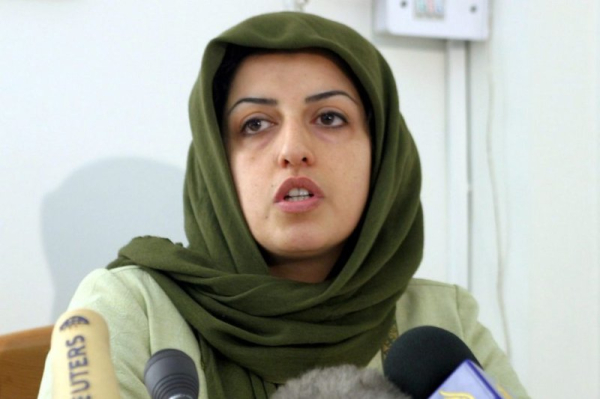
Imprisoned Iranian activist Narges Mohammadi, seen here in January 2005, was awarded the 2023 Nobel Peace Prize on Friday. File Photo by Abedin Taherkenareh/EPA-EFE
Imprisoned Iranian activist Narges Mohammadi was awarded the 2023 Nobel Peace Prize Friday for her determination to fight for women, human rights and freedom in the oppressive state.
The Norwegian Nobel Committee granted the award to Mohammadi who is currently in prison after having been sentenced to a total of 31 years in prison and 154 lashes for her work against the oppression of women. She has been arrested 13 different times in Iran and convicted five times. Advertisement
“Narges Mohammadi is a woman, a human rights advocate and a freedom fighter,” the committee said. “In awarding her this year’s Nobel Peace Prize, the Norwegian Nobel Committee wishes to honor her courageous fight for human rights, freedom and democracy in Iran.”
In 2003, Mohammadi became involved with the group Defenders of Human Rights Center in Tehran, founded by another Iranian female Nobel Peace Prize laureate Shirin Ebadi. She was arrested for the first time in 2011 for helping incarcerated activists and their families.
Two years later, while out of prison on bail, Mohammadi began protesting against Iran’s frequent use of the death penalty, leading her to be arrested again in 2015. Advertisement
During the latest stint in prison, she began speaking out against the use of torture and sexualized violence targeting political prisoners in Iran, which particularly targets women.
In July 2020, a group of United Nations human rights experts called for her release from prison as she was hospitalized after exhibiting symptoms of COVID-19.
She continued her activism from inside Tehran’s notorious Evin prison, organizing a group of protesters while Iran was consumed with widespread protests over the September 2022 death of Mahsa Jina Amini while in the custody of the Iranian morality police for not wearing her hijab correctly.
“From prison, she expressed support for the demonstrators and organized solidarity among her fellow inmates,” the Nobel Prize said. “The prison authorities responded by imposing even stricter conditions. Ms. Mohammadi was prohibited from receiving calls and visitors.
“She nevertheless managed to smuggle out an article which The New York Times published on the one-year anniversary of Mahsa Jina Amini’s killing. The message was: ‘The more of us they lock up, the stronger we become.’ From captivity, Ms. Mohammadi has helped to ensure that the protests have not ebbed out.”